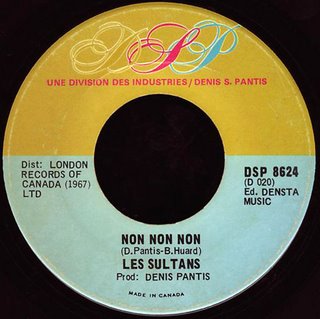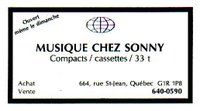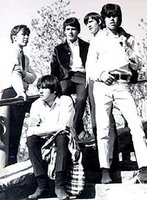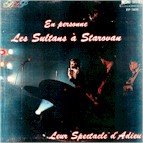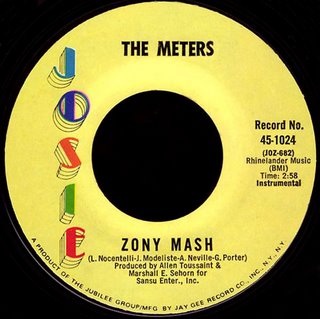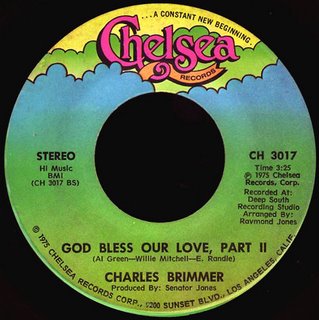 God Bless Our Love, Part II
God Bless Our Love, Part IICharles Brimmer was born in 1948, and grew up in the legendary Ninth Ward down in New Orleans. By the time he was in High School he was singing with The Ravens, a neighborhood vocal group.
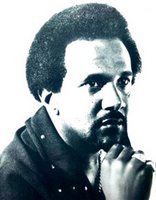
His first recording was apparently made with his brother Ivory and released on the New York based Geneva label. By the age of 19, however, he had signed with the local ABS (Always Better Sounds) label which was run by Camille Indacon and distributed by
Cosimo Matassa's Dover Records.
Wardell Quezergue was the label's arranger, and they came up with a minor local hit with
The Glide. He became quite popular on the Crescent City soul circuit, performing with David Battiste and The Gladiators, and was able to pay his way through college.
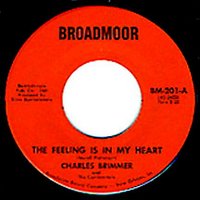
He was noticed by
Dave Bartholomew at this point, and he signed him to his
Broadmoor imprint in 1967. His first single for the label,
Now She's Gone, Gone, Gone b/w Black Is Beautiful, didn't do much, but his second release,
The Feeling Is In My Heart (with vocal back-up provided by 'The Continentals'), would become somewhat of a regional smash, and helped propel Charles' career to the next level. Bartholomew failed to promote the record, and in some tangled business deal, reneged on a promise to release an album through ABS/Dover once he sold enough singles. Although he continued to perform, Brimmer essentially gave up on recording.
This was at about the same time that local mover and shaker
Senator Jones was starting up his family of small record labels. The first release on
Hep'Me was by a local keyboard player and High School music teacher named Raymond Jones (Ray J) in 1973. Ray had also become the organist and musical director of Charles' band, and it wasn't long before he convinced him to record again.
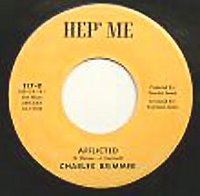
When Charles' cover of
O.V. Wright's
Afflicted was released on Hep'Me the following year, it was a big local hit. According to Brimmer, however, people were buying it for the b side, a soulful story-teller called
Your So Called Friends that he had written himself. In any event, the record got the attention of
Willie Mitchell up in Memphis, who offered to lease the single and produce an album on Charles for
Hi Records. Broadmoor/ABS claimed that they still owned the album rights (!) on him, however, and basically squashed the deal.
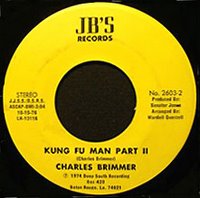
His next single for the Senator, the forgettable
Kung Fu Man, was released on his JB's label and didn't sell much (even though it had been arranged by Wardell Quezergue!). Jones had now moved his operations to Deep South Recording in Baton Rouge, as Cosimo Matassa had gone bankrupt and left New Orleans without a studio of its own.
When Hi released the incredible
Al Green Explores Your Mind in 1974, a track from the album,
God Bless Our Love, became a favorite on black radio stations everywhere. Hi, in an effort to boost sales of the album, refused to release it (or another little cut from the LP,
Take Me To The River) as a single.
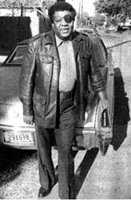
Ever the entrepreneur, the Senator saw his chance and brought Charles and Raymond Jones to Baton Rouge to record a cover of the tune. They had been playing it in their live shows, and ran through it in the studio as a rehearsal. The tape was already rolling, however, and much to their dismay, the Senator decided that that was all he needed. He must have been on to something, as the laid-back soulful rendition took off like wildfire in New Orleans. The initial pressing of
The New, God Bless Our Love (JB's 2607) sold out immediately, and there were orders for 10,000 more. As was often the case with these small regional labels, Jones was in no position to finance that kind of thing, and began looking for a national company to lease the record to.
Wes Farrell had started his Chelsea and Roxbury labels in 1972 with that sole purpose in mind. Without him, great records by artists like
William DeVaughan and
New York City may never have made the charts. Chelsea jumped at the chance to handle Brimmer, and liked the record so much that they released it twice, sending it to #43 R&B in 1975, and right back at ya, cracking the bottom rungs of the Hot 100 two years later. These national chart numbers don't really reflect what a huge record this was in the South, though. I mean by the time we join him here on Part II, Charles is just TESTIFYING, ain't he? This is the essence of soul, man... it just knocks me out.
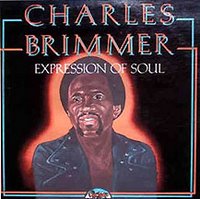
Chelsea would go on to release two excellent albums by Charles,
Expression Of Soul in 1975 and
Soul Man the following year. The fact that they have yet to be released on CD is positively criminal.
Poor promotion, and what Charles viewed as a lack of interest in providing quality production on his records combined to keep him a "small fish in a big pond", and he left Chelsea shortly thereafter. A couple of releases on family owned labels like King Kokomo and Brimco would follow, but for the most part Brimmer 'kept his day job' as a CPA and head of an industrial cleaning outfit in New Orleans. He is married to Fats Domino's daughter, Andrea...
(At this point I'd like to thank
Jeff Hannusch,
Barry Fowden,
John Ridley,
Colin Dilnot and
Dan Phillips who have all travelled this road before me...)

Now, here's where things get a little interesting... while 'googling' Charles Brimmer for this post I found out a few things. On August 29th of last year, he was one of fourteen family members to be rescued from the second story of his father-in-law's home on Marais St. in the Lower Ninth Ward as Katrina's floodwaters swirled around them.
He was among the first to return, and is quoted in a
Reuters article from October 19th, when he was helping Fats retrieve whatever he could from what was left of his house.
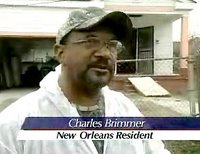
On January 11th, he was featured in a PBS
News Hour segment about cleaning up the Lower Ninth (you can check out the video
here...). Nowhere in any of this coverage does anyone mention the fact that he just happens to be one of the greatest deep soul singers that ever lived.
Amazing.
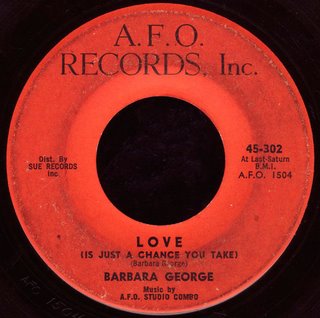
 When I got back from the road trip, I was saddened to learn that Crescent City legend Barbara George had lost her battle with Hepatitis, and died of a lung infection on August 10th. George, pictured here performing at Emperor Ernie K. Doe's wake in 2001, was best known for her monster 1962 hit, I Know. That song, as well as an excellent write-up about Barbara's life and times, was featured at the mighty Home Of The Groove by my pal Dan Phillips on August 17th. I'd like to take this opportunity to feature the other side of the record.
When I got back from the road trip, I was saddened to learn that Crescent City legend Barbara George had lost her battle with Hepatitis, and died of a lung infection on August 10th. George, pictured here performing at Emperor Ernie K. Doe's wake in 2001, was best known for her monster 1962 hit, I Know. That song, as well as an excellent write-up about Barbara's life and times, was featured at the mighty Home Of The Groove by my pal Dan Phillips on August 17th. I'd like to take this opportunity to feature the other side of the record.
